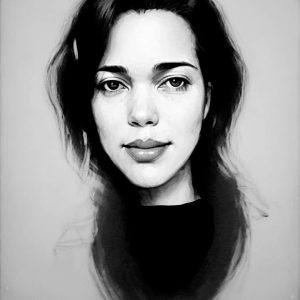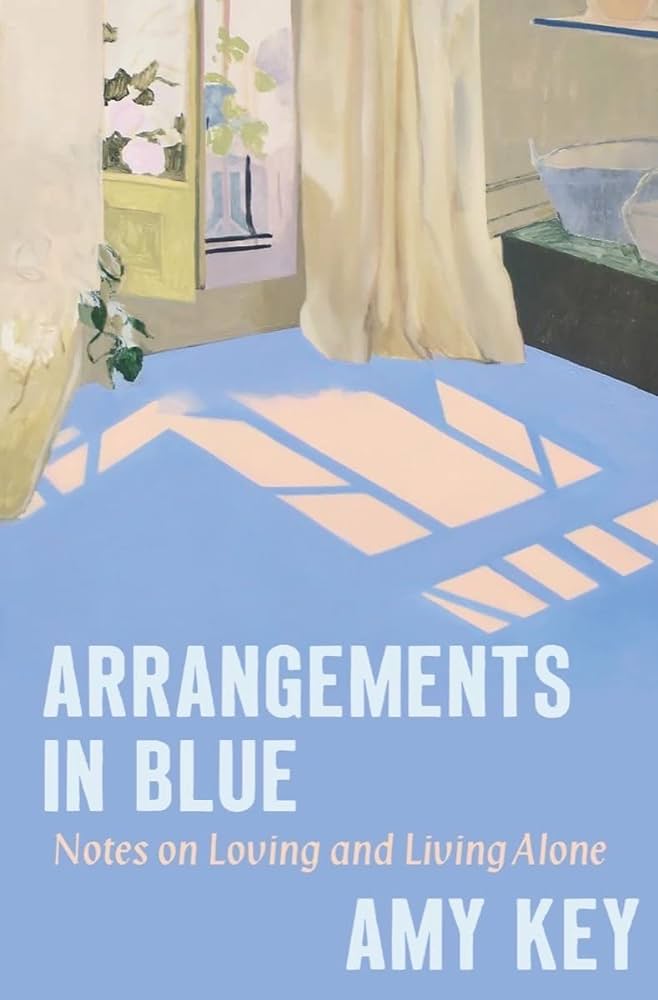Review by Nicole Louie
When I started reading Arrangements in Blue, I couldn’t name a single Joni Mitchell song. By the time I finished, I had become quite familiar with her work, and “River” was one of my new favorite songs.
In her first nonfiction work, poet Amy Key pays tribute to Joni Mitchell’s most acclaimed album, Blue, which she considers the basis for her view on romantic love. Chapter by chapter, Key dissects her life and the album while creating parallels between the two.
It’s remarkable to think that a collection of 240 pages could ask — and sometimes answer — many big questions about a life lived without placing romantic love at its center, but it often did. Guided by Key’s well-captured stream of consciousness, my view on single lives and the status society attributes to couples expanded with passages such as:
“I wonder if we all lose by centering romantic love in our lives. And it does still feel like romantic love is centered. Even as the internet has helped us find our own warm pocket of community within the endless variations of romantic and sexual identity, even though state and church control of who can and cannot be romantically and sexually involved and who can have their romantic relationship recognized has loosened. Nothing has displaced romantic love from its holy status.”
As her story progresses from her twenties to her thirties, Key reflects on how the absence of a partner influences the pace, mood, and direction of her routine. From redefining “a family home” to a house shaped by her needs to appreciating time alone while deriving joy from friendships, she gives us full access to what her days look and feel like as someone who hasn’t been in a long-term relationship for over two decades.
Not everything is positive or upward, though. Sometimes, she talks about being single with deep sorrow and other times with the confidence of not being bothered by it. Her nuanced narrative makes space for confessions of jealousy and regret, as well as questioning the parts of adulthood she would miss if she were to continue to be the sole curator of her life.
As this curator, she has collected special objects from her life experiences as well as those that belonged to loved ones, such as those her grandparents left behind: the cutlery and crockery that enchanted her, the cutglass serving bowls that caught the light, the special spoon for grapefruit and the special spoon to scoop a boiled egg — all of which became a source of tremendous comfort to her. Amy’s ruminations on her acquired and inherited collections are particularly insightful:
“These objects seemed to possess an inscrutable but absolute adulthood. In the accumulation of objects that played very specific roles, I too would attain that quality: the beautiful mystery in command of having an adult place in the world. A relationship to objects that could cause me to collide with lonesomeness, where romantic love could charge the material world with symbols of the presence or absence of someone I loved.”
We are also pulled into thoughts about other aspects of her life that are shaped by her singlehood, such as the absence of children of her own and her mixed feelings about motherhood:
“I held within me a mild, almost comforting channel of neutrality that I could draw on whenever I was confronted with either a direct question about having children or other people’s pain and joy in relation to that same question. I felt lucky to have escaped baby panic; that I’d somehow overrun the settings of my biology, which almost everyone told me I’d be faced with sooner or later. (…) Each time a friend says they don’t plan to have children, I feel a deep relief that someone I’m close to affirms my child ambivalence and will also live alongside the danger of, if only occasional, regret.”
While at times Key’s prose struck me as a bit internally excessive, after giving it some thought and revisiting excerpts I highlighted in my first reading, I realized I likely felt this way because we are simply not exposed to solo women’s inner lives enough to celebrate their depth and importance. Thankfully, this book is a perfect opportunity to expand our thinking to the shades of lyrical blue Key gives us about her life without a romantic partner.
*********************
Thank you, Nicole, for another great review for the LiveTrue Books collection!

Nicole Louie is a writer and translator based in Ireland. Her essays and poems have appeared in Oh Reader magazine, Loft, What’s the Theme Zine, among others. You can find her on Twitter and Instagram: @bynicolelouie. Her first book, Others Like Me: The Lives of Women Without Children is out in June.

